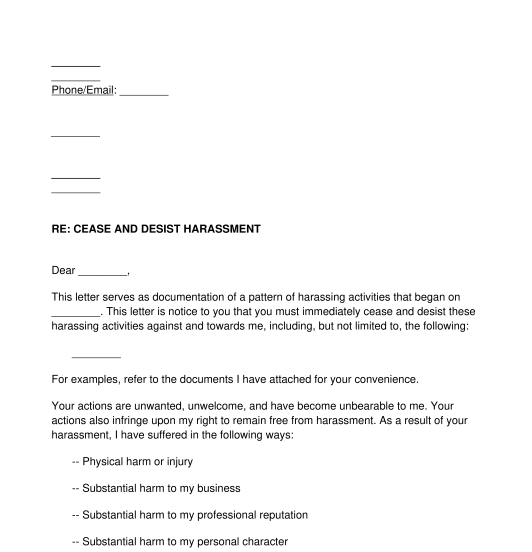 10/03/2025
10/03/2025

Answer a few questions and your document is created automatically.

Your document is ready! You will receive it in Word and PDF formats. You will be able to modify it.




Rating: 4.8 - 413 votes
Download a basic template (FREE) Create a customized documentA harassment cease and desist letter is a letter used by someone who is being harassed by a coworker, neighbor, or other individual or business.
The cease and desist letter acts a formal request that the recipient stop ("cease") and not continue ("desist") the harassing behavior. If the recipient of the letter fails to comply with these demands, the sender may then take further legal action to stop the behavior that is harming or interfering with their life. This letter acts as a first warning and puts the recipient on notice.
People use cease and desist letters to request that someone stop many types of behavior. An intellectual property cease and desist letter is used to demand that someone stop intellectual property infringement. A debt collection cease and desist letter is used to demand that creditors and debt collectors stop aggressive communications in an attempt to collect a debt. This harassment cease and desist letter is used specifically to request that the recipient stop their harassment of the sender.
Though both of these documents are used to request that someone stop a behavior, they are used in different situations. This letter is used specifically to ask that the recipient stop harassing the sender. The general purpose cease and desist letter has a broader use and can be used to request that someone stop any behavior, such as walking across the sender's lawn or parking too close to the sender's car.
Harassment is any behavior that disturbs or upsets a person. This could be physical harassment, such as assaulting someone, psychological harassment, such as sending someone threatening or hateful letters, or sexual harassment, such as making unwanted sexual advances towards a person.
Once the letter has been written, it should be printed out and signed by the sender. The sender should also attach any proof of the harassment, such as photographs, letters, or emails. The sender should mail the letter and any supporting documentation to the recipient via certified mail so that they have a record of when the letter was sent and when it was received.
A valid letter must contain at least the following mandatory clauses:
Both federal and specific state laws prohibit harassment in many situations. Title VII of the Civil Rights Act of 1964 outlaws workplace harassment or discrimination based on protected characteristics including race, sex, color, religion, or national origin. The Fair Housing Act prohibits harassment or discrimination in housing on the basis of those same protected characteristics. The Americans with Disabilities Act prohibits harassment or discrimination in employment and public accommodations on the basis of someone's disability status. Title IX of the Education Amendments of 1972 prohibits harassment or discrimination on the basis of sex in educational programs. States also have their individual anti-harassment and stalking laws.
You fill out a form. The document is created before your eyes as you respond to the questions.
At the end, you receive it in Word and PDF formats. You can modify it and reuse it.
A guide to help you: How to Send a Letter
Harassment Cease and Desist Letter - FREE - Template
Country: United States